8 Reasons to Install a Swimming Pool this Fall
Publication date : Saturday, August 25th, 2018

Most people think that spring is the best time to buy and install a swimming pool because summer is right around the corner. Soon after your swimming pool is built, you’re able to jump in and enjoy it! What you may not realize is that autumn is also a great season for installing a swimming pool. Warm weather may not be a blink away, but this can actually work in your favor.
Let’s cover eight great reasons why you should consider installing a swimming pool this fall.
1. Easier to find a contractor. A lot of people are having their pools installed or updated during the spring, making it harder to find a pool contractor. Even if you do find one who can start your project, they may be doing other jobs in between yours. Fall is a less busy season, giving you a wider range of pool builders and individualized attention.
2. Cooler working conditions. Since fall doesn’t typically come with 90+ degree days, your pool installers will be able to work efficiently. They’ll need fewer breaks and can fully concentrate on building you a great inground pool.
3. Enjoy autumn planting. Once the pool is complete, you can take advantage of fall plantings. The weather is cool and the soil is moist, making it a great time to plant spring bulbs, pansies, cool-season vegetables, trees and shrubs and turfgrass. You can have your pool completely landscaped by the end of fall.
4. Potential for savings. In some cases, you may be able to get discounts on a fall swimming pool installation. Ask about discontinued inventory, excess stock or other specials that pool builders may offer during the off-season.
5. Be prepared for the summer. By having your swimming pool installed now, it will be ready for the summer. You can start prepping your lawn in the spring and be ready to open the pool as soon as it’s warm enough. Here in Mississippi, many pool owners are able to open their pools as early as April.
6. Fewer hurdles to cross. Having a pool installed in the springtime can come with a few extra hurdles, such as an excess of jobs to complete, rainy weather conditions and backordered materials. That’s not to say that this can’t happen in the fall, but you’re not hard-pressed for time. If your pool is delayed a few weeks into summer, you miss out on a lot of swimming time. In the fall, you have time to spare.
7. Spread out your projects. If you plan on doing other things to your yard next summer, such as building a pool deck, you won’t have all of this money coming out of your bank account at once. You can tackle the pool for now, then complete another project next year. Many families appreciate having a break in between.
8. You may be able to claim it on your taxes. Believe it or not, it’s possible that you can deduct your new swimming pool from your taxes. This only works when your pool is for medically necessary reasons, such as if someone in the family needs swimming therapy. It’s unusual but worth checking out.
If you’re interested in installing a swimming pool over the next couple of months, call Paradise Pools for an estimate!
Your Guide to Diagnosing Swimming Pool Stains
Publication date : Friday, August 10th, 2018
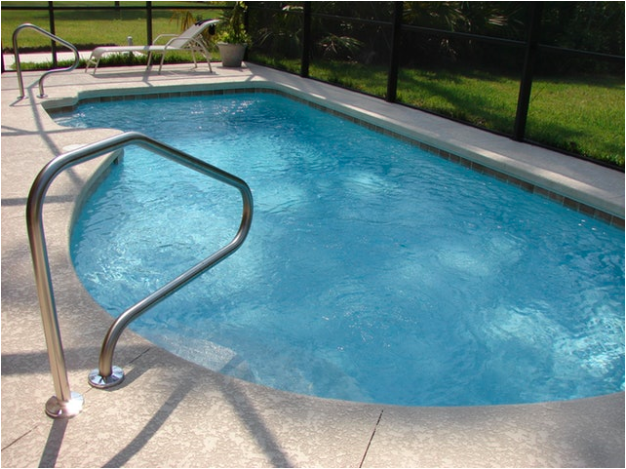
Stains and discoloration in swimming pools is nothing out of the ordinary, but they can be a visual deterrent for proud pool owners. Some pool stains can be scrubbed away while others need more powerful chemicals. The key is identifying what the stain is so that you can use the proper ingredients on it. You wouldn’t want to rush into things and make the discoloration worse!
Let’s go over the most common swimming pool stains and how to diagnose them. Some stains can be treated with natural ingredients and a bit of scrubbing power, while others will need more potent cleaners.
Most Common Swimming Pool Stains
Metal Stains
Common metals that affect pool water are manganese, copper and iron. Manganese causes brownish-black or purple stains. Copper creates teal or turquoise-green color marks. Iron produces a rusty reddish-brown color. You can control stains from metals and minerals by using a metal pool stain cleaner. These products clean and prevent mineral stains from reoccurring.
Mineral Stains
Mineral stains present themselves as film that’s mixed with dirt and oils. You can usually find these stains along the waterline of the pool. They’re scaly and white. Mineral stains can find their way onto other pool surfaces as well, not just tile. There are a number of products that can be used to treat and prevent scale film, though you’ll probably need a pumice stone to scrub the stains away.
Rust Stains
Rust stains typically occur in isolated spots, such as next to the pool ladder. This happens because pool ladders often have metal on them. Because many pools do have metal components, it’s also possible that the rust is coming from the inside. Aside from store bought products, you can also try a vinegar or baking soda solution to remove rust stains.
Waterline Stains
Waterline stains are similar to mineral stains, except they’re not scaly white deposits. Waterline stains form from oils and dirt that surface and mix with particulate matter. People also call these stains “scum lines”. To remove oily organic compounds from your pool water, try an enzyme product along with a pumice stone, stain eraser or scale remover.
Organic Stains
If you see a greenish-brown stain on your pool, it’s probably from something organic such as leaves or trees. Some animals, worms and algae can also leave organic stains on your pool. Keeping your pool covered can help prevent some of this, but it won’t deal with it entirely. If you’re still having problems, use chlorine granules to bleach out the color.
How to Treat Pool Stains
Aside from using a number of stain cleaning products, you can also shock your swimming pool. This is a quick and easy way to remove most stains. In the process, be sure to give your pool a bit of attention by scrubbing it gently with a brush. Maintenance goes a long way, too, so be sure to keep up with your pool to prevent it from getting covered in stains. Here are a few pointers:
- Keep your pool clean
- Trim back trees and bushes
- Invest in a quality pool cover
- Purchase an automatic pool cleaner
- Balance your water using chemicals
- Try a metal eliminator (for pools with metal levels)
If your pool has stains and you’re not sure what to do with them, give Paradise Pools a call. We can help you diagnose the stain and point you in the direction of which products to use.
4 Swimming Pool Myths – Debunked!
Publication date : Friday, July 6th, 2018
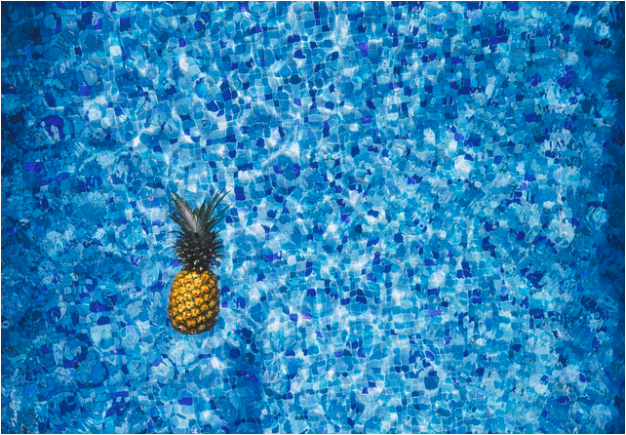
How many times have you heard not to swim until 30 minutes after eating? Is this really true or just a myth? Well, you’d be surprised to learn that this is mostly a myth. People (usually moms!) often say to wait on swimming after a full meal, otherwise you can get cramps in your legs and arms. This old saying comes from the fact that more blood is going to the stomach to aid in digestion. However, there is no evidence to support this. As long as you feel good, you can a swim right after eating!
What other misconceptions might you have believed all these years? Below we share four common swimming pool myths – and their truths!
Myth #1. A strong chlorine smell means there’s too much chlorine in the pool.
The smell of chlorine is not due to too much chlorine in the water. It actually occurs from chloramines – bacteria that chlorine attaches to in the water. When the pool is shocked, the chloramines turn into oxygen and leave the water. This is what you are smelling – chlorine in the air. However, if the chlorine is in the air, it means it’s not in the water doing its job.
Myth #2. If you swim underwater with your eyes open, they will burn.
Chlorine won’t burn your eyes, but water with unbalanced pH levels will. If you have your own personal swimming pool, you can manage pH levels easily. Test your water to determine what the pH levels are – usually you will find that they are too high. The best way to lower pH levels is by pouring muriatic acid or granular acid into the deep end of the water. To avoid burning eyes, keep the pH between 7.2 and 7.6.
Myth #3. Saltwater pools do not have chlorine in them.
Saltwater pools do have chlorine, though it’s created in a much different way. Salt water is moved through a metal cell that is charged with an electrical current, which creates chlorine. Also, salt water pools need shock treatments to keep them clean and free of algae.
Myth #4. Pools that look clean are clean.
What could be cleaner than a swimming pool with crystal clear water? Well, many things. Unfortunately, the appearance of pool water isn’t always a good indication of its quality. This is why it’s important to test your water chemistry each week to make sure that the water is healthy and won’t make your swimmers sick. If you’ll be swimming in a public pool, you can’t control the chemistry, so follow safe practices such as showering after swimming.
What myths are you most surprised by?
Are Solar Pool Covers Worth the Money?
Publication date : Sunday, June 10th, 2018
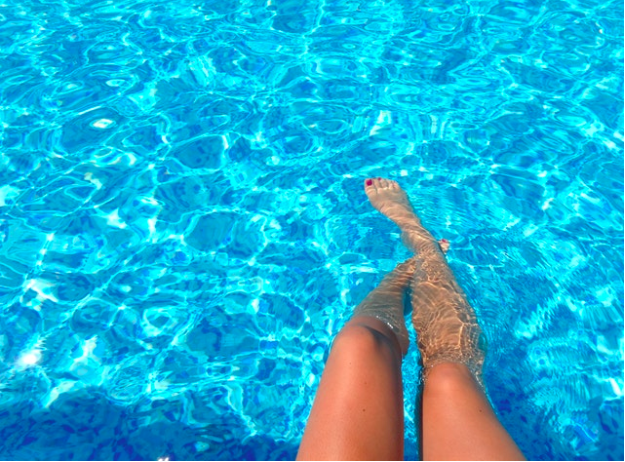
Solar covers, or solar blankets, are large sheets of plastic that go over your swimming pool. There are many types available, allowing you to find the perfect blend of thickness, color and size.
The purpose of a solar cover is to reduce heat loss due to evaporation. But, is it really worth it to have a solar cover when you may not like the look of one? We hear some pool owners complain that these covers take away from the natural beauty of their inground swimming pools.
In this post, we get down to the details of whether or not a solar cover is absolutely necessary for preventing heat loss and keeping your pool clean.
Solar Covers Prevent Water Evaporation
Research shows that pool covers can increase water temperature by 4 degrees. This can make the difference between swimming and not swimming on some cooler days. Plus, when you consider how much money it would cost to warm your pool using a gas or electric heater, a solar cover clearly saves money. In short, if you’re looking to keep your pool warm without driving up the use of a pool heater, a solar cover is the way to go.
Additional benefits to solar covers are:
- Reduced chlorine consumption
- Reduced evaporation
- Protection for pool pumps
- No need to use the hose to fill up the pool
- Reduced debris in the pool
- Decreased chance of flow blockages
All in all, a solar cover is a simple and cost-effective way to maintain a pool without having to put in a ton of work. If you choose to forgo a solar cover because of aesthetics, you’ll miss out on all of the great benefits listed above.
Solar Covers from Paradise Pools
Here at Paradise Pools, we carry various pool covers to fit the needs of our customers. Choosing the right one will make you happier with your purchase.
The tarp style is the least expensive pool cover and works well for both above ground and inground pools. Expect these covers to last for around 4 years. They prevent water loss and keep debris out, but they are not used for safety purposes.
If you need something stronger, we recommend a lockdown safety cover. This cover is much thicker and can withstand thousands of pounds of break strength! Plus, you can get 10-15 years out of these safety covers, making them a good investment.
If you have questions about solar covers and which ones are right for your swimming pool, call Paradise Pools today!
5 Great Reasons to Update Your Swimming Pool
Publication date : Thursday, May 24th, 2018
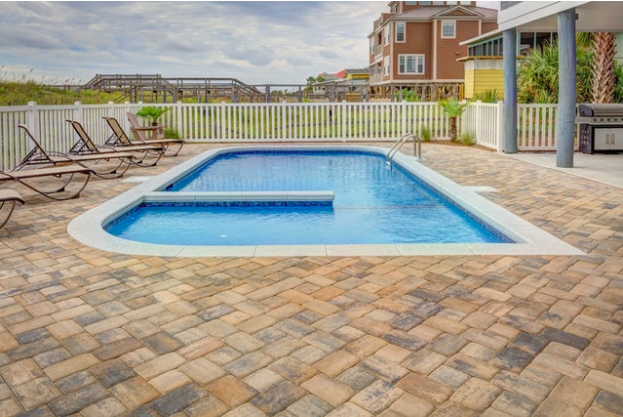
Swimming pools are incredible investments. Who knew that one home improvement project could provide exercise, strengthen family ties and teach kids essential life skills? Over time, however, swimming pools require updates to keep them in good working condition and looking their best. Luckily, many updates can be made quickly, extending the swim season rather than taking from it.
Here are five great reasons to update your swimming pool and the benefits to expect.
1. Improve Appearance
Usually, the main motivator for updating a swimming pool is to improve its appearance. Backyard pools get worn down over the years. If you don’t provide them with maintenance, they end up becoming eyesores. Call out a pool company like Paradise Pools to get suggestions on what can be done to brighten up your space. It’s possible that a new vinyl liner, freshly cleaned tile or pool deck refinishing will do the trick.
2. Add New Features
Maybe your swimming pool still looks great but the kids are becoming bored with swimming laps. Why not refresh your backyard oasis with a few new features for everyone to enjoy? Some of our favorites include diving boards and water slides, relaxing lounge spaces or stone and water features such as waterfalls and rock scapes.
3. Increase Efficiency
Pool equipment continues to get more efficient thanks to advanced technology. By taking advantage of this equipment, you can lower your electric bills and conserve water. Usually, the first things to replace are the pool heater and filtration system. But, there are many other hidden ways to boost efficiency, such as by investing in LED lighting, variable speed pumps, heat pumps, solar covers and robotic cleaners.
4. Upgrade Safety
How safe is your swimming pool? Kids grow every year, so it’s important to address all potential safety concerns. For example, you may feel better knowing that you don’t have toddlers running around, but are your school-age children able to swim? What about their friends? An upgrade allows you to address safety issues and fix them with underwater stairs, pool ladders, non-slip surfaces, fencing and alarms.
5. Allow Night Swimming
Has your family been asking to swim at night? Night swimming is a blast, and it opens up the opportunity to watch the night sky. If you don’t have the proper lighting installed, swimming in the dark is not practical or safe. Fortunately, a refresh allows you to install new lighting in and around your pool. Aim for LED lighting that uses 75% less wattage compared to incandescent bulbs.
If your swimming pool seems to be lacking, call Paradise Pools for a free evaluation. We can address areas of concern and update your pool for a more active and social summer season!
Can I Leave My Swimming Pool Open All Year?
Publication date : Sunday, October 15th, 2017
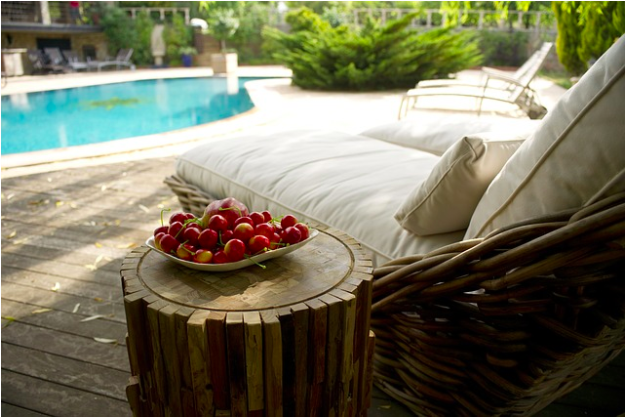
When you live in a state like Mississippi where the winters are short and mild, some pool owners consider leaving their inground pools open all year long. Now that November is upon us, you might be wondering if you have to hurry up and close your pool before the temperatures drop. Is it possible to leave the pool open year-round? What are the pros and cons?
Not closing your pool has good and bad points. Let’s explore what they are so that you can make the best decision for your pool.
The Pros
- Running water is beautiful. Some people enjoy leaving their pools open so that they can listen to running water during the winter. Water looks amazing when it glistens in the sun, and there’s just something about stepping outdoors in the quiet of winter and watching flowing water.
- Easier spring cleanup. One of the biggest hassles with opening a pool in May is that it has a lot of algae and other debris in it. Usually, it only takes a few days to remove all of this, but leaving your pool open won’t leave you with the same issues.
The Cons
- Using electricity. The nice thing about closing your pool is that you get a break on your electricity. If you leave the pool open, you’ll have to continue paying for the energy used. Fortunately, you can set your pump on a low-speed option to save money.
- No salt system. Salt chlorine generators don’t work when the water temperature gets too low, usually around 60 degrees. While this isn’t a huge deal because algae won’t be growing as much, you will still need an alternative to keep your pool sanitized.
- Freezing lines and pipes. Even though it doesn’t get too cold here in Mississippi, the temperatures can drop down to the 40s. And, if a storm rips through and knocks out the electricity, the pool’s plumbing and filter can freeze.
Is Leaving Your Pool Open Right for You?
Whether to close your pool or leave it open through the winter is up to you! Many of our customers choose to close their pools because they don’t want to continue running the pump and adding chemicals throughout the winter.
However, we do have some customers who say that leaving their pool open is best because it looks better and is far less work come springtime. If you do choose to keep your pool open, be sure that you continue with good practices such as by balancing chemicals and running the filter.
If you’d like to learn more about the advantages and disadvantages to pool closing in Mississippi, call Paradise Pools today!
Sand Filters vs Cartridge Filters
Publication date : Tuesday, May 16th, 2017
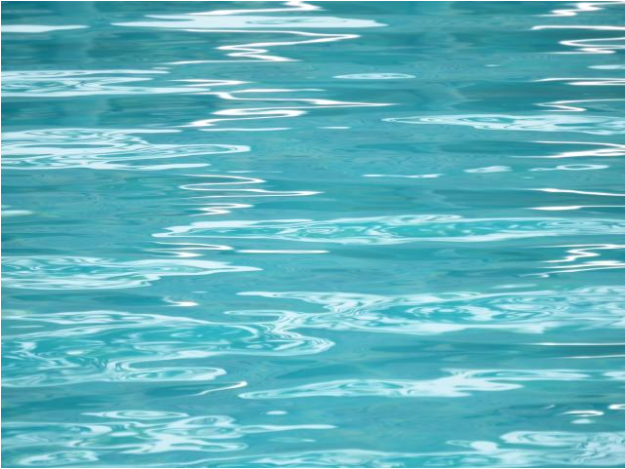
Pool filters are designed to keep your swimming pool clean and free of dirt, leaves and debris. With such an important job to do, choosing a filter deserves careful consideration. The most popular types of filters are sand filters and cartridge filters. Let’s talk more about these two types of filters and which one is right for your swimming pool.
Sand Filters
Inside the sand filter is specially designed pool filter sand that removes dirt and debris from your filtration system. The clean water is then dumped back into the pool through the bottom of the filter. There is also a backwashing effect that takes place once water flows out through the waste line, which cleans the filter.
Sand filters are easy to operate and can be used with both inground and above-ground swimming pools. They are more affordable and compact compared to other filters, and they remove 20-40 microns of dirt and debris. However, sand filters do have some limitations to be aware of. They require frequent maintenance, and the backwashing causes higher salt costs on saltwater pools.
Cartridge Filters
Cartridge filters are much more efficient at screening out dirt and debris, removing particles as small as 10-15 microns. Because they have a large filtration area, the water moves through the cartridge to remove smaller particles.
With no need for backwashing, there is far less maintenance. All you have to do is take out the filter and rinse or replace it. Cartridge filters reduce energy costs thanks to the lower pump pressure, but the cost of these filters is more pricey on the front end. However, cartridge filters have a longer lifespan because of the reduced pump pressure.
Which is Best?
Based on our experience, we feel that cartridge filters are more beneficial for MS pool owners. First, because there is no backwashing, the filters reduce water consumption and chemical usage. This puts money back in your pocket. Second, less electric is used because of the lower pump pressure. Some pool owners have seen their electric bill go down as much as 50%!
Cartridge filters can be used on most swimming pools. If you’re interested in making your pool more energy efficient with a cartridge filter, call Paradise Pools today.
Why Swim Lessons are Important
Publication date : Sunday, April 30th, 2017

Summer is right around the corner – and you know what that means – it’s swimming season! Whether you’re about to open your backyard pool, or you’re planning on spending time at the pool in your community, it’s important that you and your child know how to swim. It’s not enough for kids to just feel comfortable in the water. Having the skills to swim is vital.
According to the CDC, 37% of American adults cannot swim. From 2004-2014, there was an average of 3,536 fatalities from drownings in the United States (non-boat related). Drowning ranks fifth among the leading causes of unintentional injury. Learning to swim isn’t just a childhood activity; it’s an essential life skill that can save the life of you or your child one day.
Let’s discuss the many benefits to knowing how to swim and why you may want to enroll in swim lessons before the summer starts!
Swim with Confidence
For beginning swimmers, swim lessons focus on getting comfortable in the water. Many children are afraid to get their faces wet, and some will go into complete panic if they fall into the water. Exposing your child to the water will tame some of these fears, but it’s not until they develop the appropriate skills that they can truly build confidence.
Get More from Your Workouts
Swimming is one of the best cardio activities around, and it can be enjoyed by people of all ages and abilities. In order to get the full benefits from swimming, you must know how to use all parts of your body: arms, legs, core, etc. Standing around and floating isn’t going to give you the health benefits you’re looking for – though it’s still better than sitting on the couch!
Long-Lasting Skill
Being in the water is something that many people enjoy long into their adult and older adult years. Whether it’s boating, water skiing, fishing or relaxing on the pontoon, many people feel connected to nature when they’re by the water. Learning how to swim is a skill that can be enjoyed for the rest of your life – there’s no expiration date. As a low-impact workout, swimming is a safe alternative for older adults compared to biking or running.
Develop Teamwork and Individuality
Most sports focus on working together as a team. Teamwork teaches us to support one another, solve conflict and blend together strengths. Yet unlike other sports, swimming also has an individual component to it. You’re always trying to improve your skills, beat your best times and crush your personal records, so it’s a sport that rewards you both socially and mentally.
As you can see, knowing how to swim – not just doggy paddle or float – is an incredible skill for both kids and adults. Before the summer starts, consider enrolling in swim lessons to improve your skills and have the utmost confidence and control near the water.
Yes! Your Kids Can (and Should!) Be Helping Out with the Pool
Publication date : Monday, April 24th, 2017
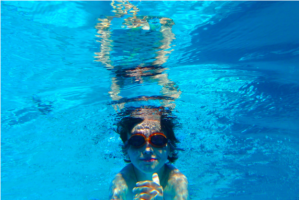
A swimming pool is kind of like a puppy. Before you have one, everyone in the family wants one. They beg. They find pictures of the type of pool they want. They promise to vacuum the pool and cover the pool and use the pool regularly. Yet once the pool is installed and the newness wears off, all those promises seem to go forgotten. Who ends up doing all of the pool maintenance? Mom and Dad. Right after they pick up after the dog.
Swimming pools are an investment. However, your pool should be worth the time and money you put into it. If you feel that you and your family are not getting what you should from your pool, it’s time to make a change. Your kids can help out with pool chores once they are in school, and this will relieve some burden from you. Aside from that, giving kids responsibilities of their own encourages them to enjoy the pool and the hard work they put into it.
Age-Appropriate Pool Cleaning Tasks
Below are some of the pool chores that kids as young as 5 can start doing. Even if it’s tough getting them motivated, stick with it! There’s nothing wrong with teaching kids how to care for their things and take pride in their home.
All Ages: Pick Up Around the Pool
The first thing you can do is have everyone be more responsible when it comes to keeping the pool area clean. Everyone should get into the habit of cleaning up after themselves after each swim: towels, toys, floats, sunscreen and other items should be placed in the appropriate spots. This keeps the space clean and tidy, plus prevents items from blowing away or falling into the filter.
Ages 5-8: Empty Skimmer Baskets
Children in this age group can empty the skimmer baskets every couple of days. Just make sure that the filters are not running, as you don’t want any of the debris to get sucked down into the filter. Teach your kids how to look for bugs or insects that might be swimming near the basket before reaching in. You can also let your child help you turn on the automatic pool cleaner.
Ages 9-12: Skimming and Brushing
Bigger kids can take on more complex jobs such as brushing the steps, using cleaning poles and skimming the water surface. This is the age where kids often become more interested in spending time in the pool and want to invite their friends over. With their hard work, they will take more of an interest in pool etiquette concerns, too!
Ages: Teens 13+
Once your child is 13 years old, they can start testing the water and adjusting pH and chlorine levels, per your discretion. Your child must be able to handle the chemicals responsibly, so go through the warning labels. Supervise your child at first, and never let them use the chemicals when you’re not home. You can also let teens set up and clean out automatic pool cleaners, empty out filter baskets and assist in filter cleanings.
Use your best judgement when assigning tasks to your children. Some will be ready to take on some of these jobs while others may need more time. Either way, kids of all ages can take responsibility when it comes to caring for the family pool.
Should I Hire a Professional to Maintain My Swimming Pool?
Publication date : Wednesday, February 8th, 2017
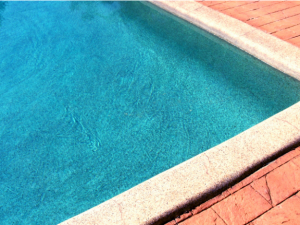
Prepping your pool for the late spring and summer is an exciting time, but it may be something that you find yourself scrambling to do. If this is the case, you may benefit from a professional pool company that will handle the maintenance for you. A pool that is well maintained is a beautiful centerpiece for your yard and an instant place to relax and unwind.
Let’s explore the benefits to hiring a professional pool service and why this year may be the year to swim more and clean less.
Opening and Maintaining Your Pool
Imagine having a helping hand when it’s time to wake your pool up from its winter slumber. New chemicals and a new cartridge filter are among the things you need to purchase. You also have to make sure that all equipment is in good working condition. All of this takes time and costs money.
The main challenge when reopening a pool is balancing the chemicals. To help, there are five tests to take: chlorine, pH levels, calcium, alkalinity and stabilizer levels. It takes most pool owners a month or so before they are comfortable handling these chemicals. Even after this month, it takes time to check the water each week and add the proper chemicals.
A professional pool service takes care of this for you. The water is tested regularly to ensure a safe and sanitary swimming environment for you and your family. Most pool companies offer convenient plans based on your needs and budget. All basic tasks will be done on a weekly basis, including skimming, vacuuming, equipment inspection and water testing.
Benefits of Hiring a Pool Maintenance Service in Jackson MS
Most pool owners in Jackson MS don’t have time for regular spa upkeep. If they miss a few weeks, algae starts to build up and cause problems with the equipment. During this time, they aren’t able to enjoy their pools. Imagine all of the time wasted when they could be swimming in their pools and enjoying the warm summer days!
It’s estimated that a pool maintenance service can save the average pool owner 3-4 hours a month! It takes about 30-60 minutes each week to vacuum and clean the pool, plus the time that is needed for water testing and chemical balancing. Hiring a pool service puts this time back into your week, which can be used to enjoy with your family.
Another benefit of hiring a pool sevice is that your investment receives regular attention. Equipment is checked on a weekly basis, and recommendations are made that can be addressed sooner rather than later, saving you money. Plus, when the chemicals are properly adjusted, the lifespan of the surfaces and equipment is prolonged.
Paradise Pools loves helping pool owners in Jackson MS save time and money! Call us today to learn more about any one of our convenient pool maintenance services.


 CALL US TODAY!
CALL US TODAY!












